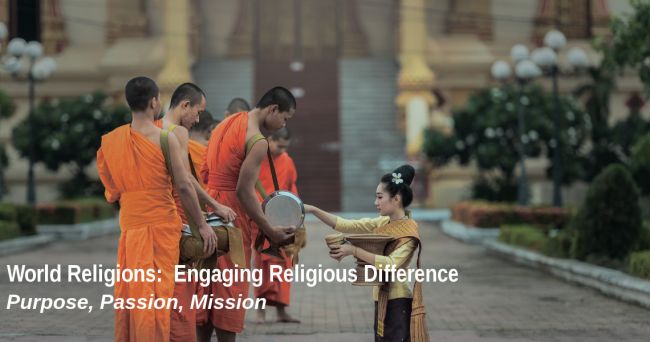Department of World Religions
Explore World Religions
Academic Programs
Dual Enrollment Academies
Certificate Programs
Associate Certificate programs
Undergraduate Certificate programs
Degree Programs
Associate Degrees
Bachelor Completion Degrees
- Major in Buddhist Studies
- Major in Hindu Studies
- Major in Islamic Studies
- Major in Judaic Studies
- Major in New Religious Movements
Bachelor 2+2 Degrees
Masters Degrees
Doctoral Degrees
Course Descriptions
Undergraduate Courses
Graduate Courses
- BUD - Buddhist Studies
- HIN - Hindu Studies
- ISM - Islamic Studies
- JUD - Judaic Studies
- NRM - New Religious Movements
- REL - Religion Studies
Resources
Contact
- Still Have Questions?
- Contact Admissions
Calendar

About the Department
The Department of World Religions seeks to provide students with the knowledge, and equip students with the skills, to effectively interact with those in other faith traditions. The courses offered by the department inform the student with an understanding of major world religions such as Judaism, Hinduism, Buddhism and Islam along with lesser-known new religious traditions.
Focusing on educating the student in the worldview of non-Christian religions, the Department combines an understanding of the theology and practices of non-Christian religions in order to prepare graduates to meaningfully dialogue across religious lines. The courses lead the student to a comprehensive view of the beliefs and worship practices of those in non-Christian religions. Out of the depths of their academic training and extensive personal experience, faculty instructs students on how to engage and interact with adherents of non-Christian faith traditions for the sake of the gospel.
Areas of Study
The Department of World Religions offers undergraduate and graduate degrees in a variety of areas including:
World Religion: encompasses the study of world religion from theological, historical, psychological, sociological, comparative, phenomenological, and philosophical perspectives
Buddhist Studies: explores Buddhist meditation, the history of Buddhism in Indian and Tibet, Buddhism in western cultural contexts, theories and methods of Buddhist studies, anthropology and cultural geography of Buddhism, how to share the Christian faith with Buddhist friends and how to start churches in Buddhist cultures.
Hindu Studies: studies Hindu theology, philosophy and ethics; theories and methods of Hindu studies, anthropology and cultural geography of Hinduism, how to share the Christian faith with Hindu friends and how to start churches in Hindu cultures.
Islamic Studies: examines the life of Muhammad, the Qur'an, Hadith & Islamic theology, a sociological understanding of Muslim peoples, current trends in Islam, anthropology and cultural geography of Islam, how to share the Christian faith with Muslim friends and how to start churches in Islamic cultures.
Judaic Studies: studies the history of Jewish culture, Rabbinic texts and traditions, modern Jewish thought, Jews and Judaism in the modern world, anthropology and cultural geography of Judaism, how to share the Christian faith with Jewish friends and how to start churches in Jewish cultures.
New Religious Movements Studies: evaluates new religious movements from historical perspectives, compares new religion theologies with the Christian tradition, explores new spirituality worldviews and their cultures, studies the worldviews and cultures of new religions, studies the anthropology of religious change, explores the cultural geography of new religious movements, how to share the Christian faith with new religious movement friends and how to start churches among new religious movement adherents.
Folk Cultures Studies: investigates folklore and folklife, folktales and oral traditions, folklife and material culture, biblical storytelling in oral cultures, an anthropology of folk religion, cultural geography of folk culture, how to share your faith with folk culture friends, and how to start churches in folk cultures.
Learning Outcomes
The Department of World Religion offers multidisciplinary courses in history, philosophy, religious studies, literature, sociology, anthropology, and cultural geography of each world religion that aid students in gaining an understanding of its past and present. Students majoring in study of a world religion should graduate with:
- knowledge of the growth and development of the religion, it's history, and culture from the ancient to the contemporary periods.
- an understanding of the connections and competitions between different religious and cultural traditions within the religion that developed in distinct historical periods
- the critical skill set to use the religion's history to identify and analyze the cultural, social and political dynamics that shape contemporary majority/minority relations
- the ability to evaluate the influence of living in diverse societies on the world religion's adherents and to identify changing responses by the religion's adherents to theological, religious, societal, and political changes
- knowledge of different literary and historical genres of the religion's literary, cultural and religious writing
- the ability to share the Christian faith in a dialogical, conversational manner that is both faithful to the gospel message and respectful of a person's religious traditions
- the capacity to create and produce informed, objective research and communicate a point of view with clarity both orally and in writing
